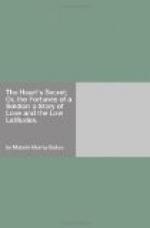Until within a very short time she whom he loved was to him as some distant star, that might be worshipped in silence, but not approached; but now, by a series of circumstances that looked like providential interference in his behalf, immense barriers had been removed. Thinking over these matters, he doubly realized the misstep he had taken, and the heart of the lone prisoner was sad in the depths of his dreary dungeon.
Many days passed on, and Lorenzo Bezan counted each hour as one less that he should have to live upon the earth. At first all intercourse was strictly denied him with any person outside the prison walls, but one afternoon he was delighted as the door of his cell was thrown open, and in the next moment Ruez sprang into his arms.
“My dear, dear friend!” said the boy, with big tears starting from his eyes, and his voice trembling with mingled emotions of pleasure and of grief.
“Why, Ruez,” said the prisoner, no less delighted than was the boy, “how was it possible for you to gain admittance to me? You are the first person I have seen, except the turnkey, in my prison.”
“Everybody refused me; General Harero refused father, who desired that I might come and see if he could not in some way serve you. At last I went to Tacon himself. O, I do love that man! Well, I told him General Harero would not admit me, and when I told him all—”
“All of what, Ruez?”
“Why, about you and me, and sister and father. He said, ’Boy, you are worthy of confidence and love; here, take this, it will pass you to the prison, and to Captain Bezan’s cell;’ and he wrote me this on a card, and said I could come and see you by presenting it to the guard, when I pleased.”
“Tacon is just, always just,” said Lorenzo Bezan, “and you, Ruez, are a dear and true friend.” As the soldier said this, he turned to dash away a tear-confinement and late sickness had rendered him still weak.
“Captain?”
“Master Ruez.”
“I hate General Harero.”
“Why so?”
“Because sister says it is by his influence that you are here.”
“Did Isabella say that?”
“Yes.”
“Well, tell me of your father and sister, Ruez. You know I am a hermit here.”
Lorenzo Bezan had already been in prison for more than ten days, when Ruez thus visited him, and the boy had much to tell him: how General Harero had called repeatedly at the house, and Isabella had totally refused to see him; and how his father had tried to reason with General Harero about Captain Bezan, and how the general had declared that nothing but blood could wash out the stain of insubordination.
With the pass that the governor-general had given him, Ruez Gonzales came often to visit the imprisoned soldier, but as the day appointed for the trial drew near, Ruez grew more and more sad and thoughtful at each visit, for, boy though he was, he felt certain of Lorenzo Bezan’s fate. He was not himself unfamiliar with military examinations, for he was born and brought up within earshot of the spot where these scenes were so often enacted by order of the military commission, and he trembled for his dearly loved friend.




